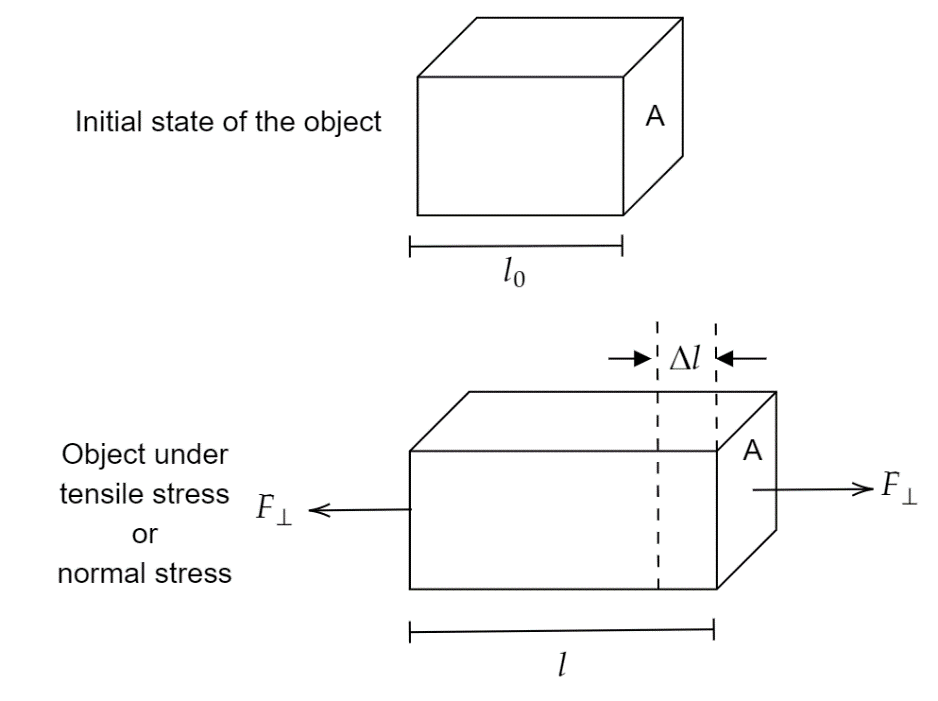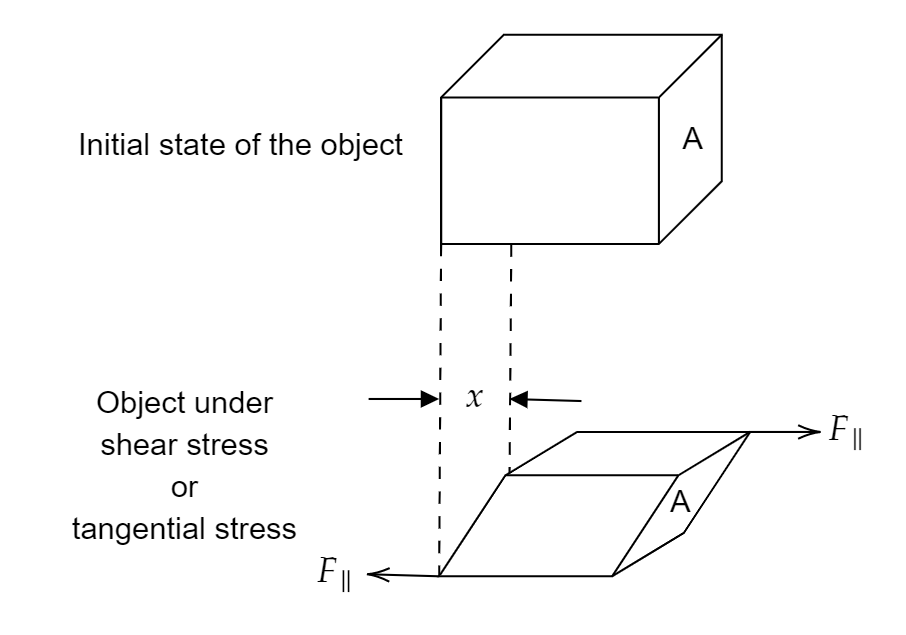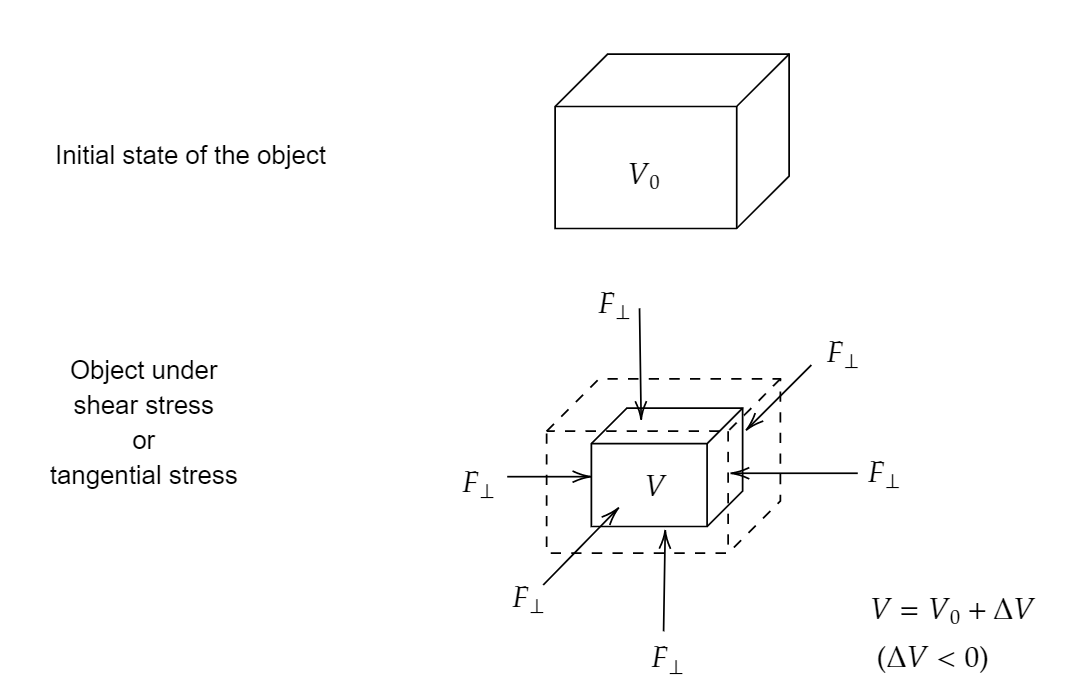Stress - Definition, Unit, Types, FAQs
Stress in physics is a fundamental concept that explains how materials respond when an external force is applied. When a force acts on a body, it produces stress, which is defined as force per unit area. Stress plays an important role in understanding deformation, elasticity, and material strength. It helps engineers and students analyze how structures like bridges, buildings, and machines withstand applied forces. This topic also includes important concepts such as tensile stress, shear stress, bulk stress, Hooke’s Law, thermal stress, and elastic potential energy. Understanding stress and its types is essential for Class 11 Physics, board exams, and competitive entrance examinations.
This Story also Contains
- What is Stress?
- What is the Unit and Dimension of Stress?
- Types of Stress

What is Stress?
Stress definition is, the force that acts on a body of per unit area. The effect of stress causes strain in the material. Stress is the process which helps to deform the material. Stress in physics, helps us to understand the force that a material or object experiences.
What is the Unit and Dimension of Stress?
SI Unit of Stress
Stress is defined as force per unit area:
$
\text { Stress }=\frac{\text { Force }}{\text { Area }}
$
Since the SI unit of force is Newton ( $\mathbf{N}$ ) and the SI unit of area is $\mathbf{m}^{\mathbf{2}}$,
$
\text { SI unit of Stress }=\frac{N}{m^2}
$
This unit is also called Pascal (Pa).
$
1 \text { Pascal }=1 \mathrm{~N} / \mathrm{m}^2
$
Dimensional Formula of Stress
We know:
Force $=$ Mass × Acceleration
$[F]=\left[M L T^{-2}\right]$
Stress $=$ Force $/$ Area
$
\text { Area }=\left[L^2\right]
$
So,
$
\begin{aligned}
& \text { Stress }=\frac{\left[M L T^{-2}\right]}{\left[L^2\right]} \\
& =\left[M L^{-1} T^{-2}\right]
\end{aligned}
$
Also read -
Types of Stress
A. Tensile Stress or Normal Stress
The tensile stress definition is given below-
The external force per unit area of material resulting in a stretch of material is known as tensile stress. We say that the object is in tension. The subscript is a reminder that force acts perpendicular to the cross-section.

We define tensile stress at cross-section as ratio of force F to cross-sectional area A:
Normal stress=FA----(1)
This is a scalar quantity. The SI unit of stress is pascal. Equation (1) shows that 1 pascal equals 1 newton per square meter (N/m²) :
$1 \mathrm{~Pa}=1 \mathrm{~N} / \mathrm{m}^2$
The unit of stress is the same as that of pressure. Air pressure in automobile tires is typically around 300 kPa.
B. Shear stress or tangential stress
The figure shows a body being deformed by shear stress. A force acting in a generally horizontal direction especially or force that produces mountain folding and over thrusting.

C. Bulk stress or Volumetric stress
Thus, bulk stress or volume stress is also can be called as pressure.
Bulk stress or Volume stress=p=FA.

|
Related Topics, |
Hooke’s Law
Hooke’s Law is defined as the ratio of stress to strain.
StressStrain=Hooke's Law (Elastic Modulus)
The relation between stress and modulus of elasticity:
- Young's Modulus Y=Tensile stress or Normal stressTensile strain or normal strain
- Shear Modulus G=Shear stress or tangential stress shear strain or tangential strain
- Bulk Modulus B=Normal stressVolume strain
Thermal stress
The stress which is developed due to the rise or fall in temperature is known as thermal stress.
Let us consider that a rod of length $L$ is fixed between two rigid walls and is heated to raise the temperature by $\Delta \theta$. Hence, due to the rise in temperature, there develops a strain which is represented by $\Delta L L$.
From Young's Modulus $Y=$ Stress/Strain
We get, Stress $=Y \times$ Strain $=Y \Delta L / L$.
Relation between Stress and Elastic Potential Energy
Elastic Potential energy is defined as total work that is done against the restoring force that stretches a material by any length.
The relation with stress is,
Elastic Potential Energy
$U=\frac{1}{2}$ Stress $\times$ Strain
Also, check-
- NCERT Exemplar Class 11th Physics Solutions
- NCERT Exemplar Class 12th Physics Solutions
- NCERT Exemplar Solutions for All Subjects
NCERT Physics Notes :
Frequently Asked Questions (FAQs)
Stress meaning in physics, is the amount of force that acts on any material with unit surface area. It is the property by which we can understand the limit of deformation of any material.
There are mainly three types of stress in physics-
Tensile stress or Normal stress: Tensile stress or normal stress is defined as the stress, when the force F acts normal to the surface of the material to a cross-sectional area A. The formula of tensile or normal or longitudinal stress is, Normal stress=FA. Normal stress is also known as longitudinal stress.
Shear Stress or Tangential stress: Shear stress or tangential stress is defined as the stress where the forces F act tangentially to the opposite ends of an object of surface area A. The formula of shear or tangential stress is, Tangential Stress=FA.
Bulk stress or Volumetric stress: Bulk stress or volume stress is defined as the force which acts tangentially on the surface of a body which causes a change in its volume or pressure. This stress symbol is, ∆p where p is pressure which can be written as p=F/A.
The hoop stress formula is H=PDm/2t where, H= hoop stress, P = pressure, t = thickness of the pipe and Dm = diameter of the pipe.
Yes but only under elastic conditions and in equilibrium.
When a body is deformed (stretched, compressed, or twisted), an internal restoring force develops inside the material. This restoring force acts in the opposite direction to the applied deforming force.
Questions related to
On Question asked by student community
Dear student,
Which college are you asking about?
If you tell me the name of the college, I’ll be able to give you proper details about how they support mental health, what kind of clubs and events they have, and how accessible the teachers and staff are. Every college is
Hello there,
CBSE's plan for two board exams a year aims to reduce stress, but at the ground level, it creates challenges :
-
Faster Syllabus Completion
– Schools may
rush through topics
, affecting conceptual learning.
- Increased Pressure – Teachers and students will have less time for revision , leading
Hello,
I understand the situation, and it is indeed possible to attempt your Class 12 exams, even if there has been less attendance due to medical issues. Here's what you can do:
- Medical Documentation: Obtain a medical certificate from your doctor about your condition. This will also help explain frequent
Hi,
It sounds like you're looking for ways to manage stress. Here are a few activities that are known to help reduce stress, along with one that generally does not:
-
Exercise :
-
Meditation and Mindfulness :
-
Healthy Eating :
-
Procrastination :
Stress during exam season is normal. Try to take breaks in between while studying. If it becomes overwhelming, don't hesitate to ask for help from friends, teachers and family members. You can check out the following tips while preparing for the GSEB board exam:
-
Make a healthy study schedule with
